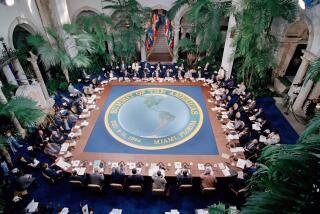Talks Seen as Vital, Poll Shows : Spy Case Shouldn’t Bar Summit, Americans Feel
- Share via
WASHINGTON — Most Americans believe that a summit meeting between President Reagan and Soviet leader Mikhail S. Gorbachev is too important to cancel over the Soviet indictment of American reporter Nicholas Daniloff, a Times Mirror survey has found.
In a poll conducted this past week, a solid majority of 71% said Reagan should meet with Gorbachev even though Soviet authorities have detained Daniloff, a Moscow correspondent for U.S. News & World Report, on espionage charges.
A smaller majority of those questioned--51%--said they do not believe that the Daniloff case will seriously harm U.S.-Soviet relations.
At the same time, many of those interviewed expressed a degree of uncertainty over Daniloff’s role. When asked whether it is possible that Daniloff was actually involved in espionage against the Soviet Union, 24% said there was no chance whatever, 34% said a small chance, 22% a moderate chance and 10% a good chance.
But when asked why they believe that Soviet authorities seized Daniloff, 65% said Moscow’s aim was to trade the reporter for accused Kremlin spy Gennady F. Zakharov, who was arrested by the FBI in New York last month. Only 14% said they believe that the Soviets genuinely believe that Daniloff is a spy.
The poll was conducted by the Gallup Organization, and the results are part of the second phase of a continuing “Press & the Public” survey commissioned by the Times Mirror Co., parent company of The Times.
“The most important finding is that the American public is not willing to see the summit canceled, despite their belief that Daniloff has been dragooned,” said Andrew Kohut, president of the Gallup Organization in Princeton, N.J. “People put a priority on high-level talks about reducing the chances for nuclear war.”
Reagan and other U.S. officials have said they intend to press ahead with plans for a summit meeting with Gorbachev before the end of the year, although they have warned that those plans will be endangered if Daniloff is not cleared of spying charges.
Meeting With Reagan
Secretary of State George P. Shultz met on Friday with Soviet Foreign Minister Eduard A. Shevardnadze to discuss the Daniloff case and the prospects for a summit, which would be Reagan’s second meeting with the Soviet leader. Shultz also took Shevardnadze to meet with Reagan, so that the President could express his views directly about the Daniloff case. Several members of Congress--including Senate Foreign Relations Committee Chairman Richard G. Lugar (R-Ind.), Sen. Daniel Patrick Moynihan (D-N.Y.) and Rep. Jack Kemp (R-N.Y.)--have urged Reagan to call off all summit preparations unless Daniloff is freed, but the Administration has rejected the idea.
The results of the Times Mirror poll suggest that Reagan and Shultz face little risk of a public backlash if they continue negotiating with Moscow despite Daniloff’s detention.
One question asked was: “Do you feel that the Reagan Administration should refuse to attend a summit as long as Daniloff is held, or do you think the summit is too important to cancel over this matter?” To this, 71% replied that Reagan should go ahead; 20% said he should cancel, and 9% said they did not know.
People who described themselves as Republicans were solidly in favor of a Reagan-Gorbachev summit, 66% to 25%. Democrats said they want the meeting to go ahead, 76% to 15%.
Effect on U. S. Reporters
Most Americans believe that Daniloff’s arrest will not deter U.S. reporters in Moscow from pursuing important stories--or from coming into conflict with Soviet authorities over their reporting practices.
A solid 52% said the Daniloff case will not affect the behavior of Western correspondents, and 16% said it could make them more likely to go after important stories; 22% said it could make them less likely to do so.
When asked whether an American reporter can do a good job in Moscow without seriously risking getting into trouble with Soviet authorities, 63% said no and 28% said yes.
The poll results are based 776 telephone interviews with adults conducted from Sept. 13-17. A nationwide sample that size yields results with a margin of error of 4% plus or minus.
More to Read
Sign up for Essential California
The most important California stories and recommendations in your inbox every morning.
You may occasionally receive promotional content from the Los Angeles Times.










